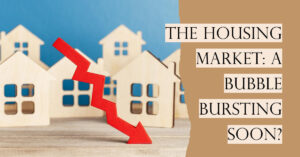The housing market has been on a rollercoaster ride in recent years. Soaring prices fueled by low interest rates and high demand created a frenzy, sparking concerns of another bubble similar to the 2008 crash. But as we enter 2024, the landscape is shifting. Prices are plateauing, interest rates are climbing, and whispers of a bubble burst are swirling. So, are we truly in a bubble about to pop, or is this just a market correction in the making?
A housing bubble is a sustained but temporary condition of over-valued prices and rampant speculation in housing markets. It is characterized by rapidly rising home prices, fueled by demand, speculation, and exuberant spending. Housing bubbles typically end with a sharp decline in home prices, which can lead to foreclosures and a recession.
It is important to understand whether we are in a housing bubble because it can have a significant impact on the economy and individuals. If a housing bubble bursts, it can lead to a decline in consumer spending, a loss of jobs, and a recession. It can also make it more difficult for people to buy or sell homes.
In this blog post, we will examine the signs of a housing bubble and the risks associated with it. We will also provide advice on how to protect yourself from the risks of a housing bubble.
Are We in a Housing Bubble in 2024?
The housing market in 2024 is experiencing changes, but most real estate professionals do not believe that the housing market is in a bubble or poses a threat to the faltering economy. While there are signs of a slowdown in the housing market's year-over-year growth rate, the overall data and forecasts suggest that a crash is not expected.
Signs Pointing to a Correction:
- Rising interest rates: The Federal Reserve's interest rate hikes have significantly impacted affordability, dampening buyer enthusiasm. Higher rates translate to higher monthly payments, squeezing budgets and pushing some buyers out of the market.
- Cooling price growth: After years of exponential gains, home price growth has started to slow down. While some markets still see increases, the national trend is a moderation, not a collapse.
- Inventory on the rise: Though still low compared to historical levels, housing inventory is slowly increasing. This gives buyers more options and bargaining power, taking the edge off the seller-heavy market.
- Stricter lending standards: Unlike the loose lending practices that contributed to the 2008 crisis, today's mortgage requirements are stricter. This helps ensure borrowers are financially qualified and lessens the risk of defaults.
What Are the Signs of a Housing Bubble?
A housing bubble is a period marked by an unusual spike in housing prices fueled by high demand and low supply, speculation by investors, and exuberant spending. It is a type of economic bubble that occurs periodically in local or global real estate markets, and it typically follows a land boom.
A land boom is a rapid increase in the market price of real property such as housing until it reaches unsustainable levels and then declines. Housing bubbles usually start with an increase in demand, in the face of limited supply, which takes a relatively extended period to replenish and increase.
Speculators pour money into the market, further driving up demand. At some point, demand decreases or stagnates at the same time supply increases, resulting in a sharp drop in prices—and the bubble bursts.
The key signs of a housing bubble include:
- Rapidly rising home prices: Home prices that are rising faster than income growth and other economic indicators could be a sign of a housing bubble.
- Loosening lending standards: Lenders who are willing to extend credit to borrowers with weak credit histories or offer loans with minimal down payments are engaging in risky lending practices that could lead to a housing bubble.
- Speculative buying: Investors who are buying homes as investments, rather than as primary residences, are driving up demand and contributing to a housing bubble.
Additional signs of a housing bubble:
- A decline in the inventory of homes for sale: A low inventory of homes for sale can drive up demand and contribute to a housing bubble.
- An increase in the number of new housing developments and construction projects: An oversupply of homes can lead to a decline in demand and a drop in prices.
- An increase in the number of people buying homes as investments: Investors who are buying homes as investments are driving up demand and contributing to a housing bubble.
How Does a Housing Bubble Affect the Economy
A housing bubble can have a significant impact on the economy. When home prices rise rapidly, it can lead to a number of negative consequences, including:
- A decline in consumer spending: Homeowners who are seeing the value of their homes increase may be more likely to borrow money against their home equity. This can lead to an increase in debt and a decrease in consumer spending.
- A loss of jobs: A decline in consumer spending can lead to a decrease in demand for goods and services. This can lead to businesses cutting back on production and laying off workers.
- A recession: If a housing bubble bursts and home prices decline sharply, it can lead to a recession. This is because the housing market is a major driver of the economy. When the housing market collapses, it can have a ripple effect on other sectors of the economy.
In addition to these general economic impacts, a housing bubble can also have a number of specific negative consequences, such as:
- Foreclosures: When home prices decline, homeowners who are underwater on their mortgages (i.e., their mortgage balance is greater than the value of their home) may be more likely to default on their mortgages. This can lead to foreclosures, which can have a devastating impact on homeowners and their families.
- Bank failures: If there is a large number of foreclosures, it can lead to losses for banks and other financial institutions. This can weaken the financial system and make it more difficult for businesses to borrow money.
- A decline in tax revenue: Governments rely on property taxes for a significant portion of their revenue. If home prices decline, it can lead to a decline in tax revenue, which can force governments to cut spending or raise taxes.
Overall, a housing bubble can have a significant and negative impact on the economy. It is important to be aware of the signs of a housing bubble and to take steps to protect yourself from the risks.
What Causes a Housing Bubble to Burst?
A housing bubble bursts when home prices become unsustainable and start to decline. This can happen for a number of reasons, including:
- Rising interest rates: When interest rates rise, it becomes more expensive to borrow money to buy a home. This can lead to a decrease in demand for homes and a decline in prices.
- A decline in the economy: A recession or other economic downturn can lead to a loss of jobs and a decrease in income. This can make it more difficult for people to afford to buy homes and can lead to a decline in home prices.
- A loss of confidence in the housing market: If people start to believe that home prices are going to decline, they may be less likely to buy homes. This can lead to a self-fulfilling prophecy, as a decline in demand can lead to a decline in prices.
How Can Individuals Protect Themselves During a Housing Bubble?
There are a number of things that individuals can do to protect themselves during a housing bubble, including:
- Avoid buying a home at the peak of the market: If you are considering buying a home, it is important to do your research and to understand the signs of a housing bubble. If you believe that we are in a housing bubble, it may be best to wait to buy a home until the market cools down.
- Get pre-approved for a mortgage before you start shopping for a home: This will help you to understand how much you can afford to borrow and to make sure that you are qualified for a mortgage. It is important to get pre-approved before the market gets really hot, as it may be more difficult to get pre-approved later on.
- Make a large down payment: A large down payment will give you more equity in your home and will reduce your monthly mortgage payments. This will make it easier for you to afford your home, even if prices decline.
- Choose a fixed-rate mortgage: A fixed-rate mortgage will protect you from rising interest rates.
- Have a financial cushion: It is important to have a financial cushion in case you lose your job or experience other financial setbacks. This will help you to make your mortgage payments, even if your income declines.
If you are already a homeowner, there are a number of things you can do to protect yourself during a housing bubble, including:
- Make sure that you can afford your mortgage payments: If you are struggling to make your mortgage payments, talk to your lender about options such as a loan modification or forbearance.
- Build equity in your home: Make extra mortgage payments or pay down other debt to build equity in your home. This will give you more options if you need to sell your home or refinance your mortgage.
- Consider selling your home and renting: If you are concerned about a decline in home prices, you may want to consider selling your home and renting. This can help you to avoid losing money on your home.
It is important to remember that there is no guaranteed way to protect yourself from the risks of a housing bubble. However, by taking the steps outlined above, you can reduce your risk and minimize the financial impact of a housing bubble.
Conclusion
It is important to understand whether we are in a housing bubble because it can have a significant impact on the economy and individuals. If a housing bubble bursts, it can lead to a decline in consumer spending, a loss of jobs, and a recession. It can also make it more difficult for people to buy or sell homes.
If you are considering buying a home or are already a homeowner, it is important to do your own research and to talk to a financial advisor to understand the risks of a housing bubble and to develop a plan to protect yourself.
Call to action:
Do your own research: There is a lot of information available about housing bubbles online and in libraries. Take some time to learn about the signs of a housing bubble and the risks associated with it.
Talk to a financial advisor: A financial advisor can help you to assess your risk tolerance and to develop a plan to protect yourself from the risks of a housing bubble.
FAQs
Q1: What is a housing bubble?
A1: A housing bubble refers to a sustained but temporary condition of over-valued prices and rampant speculation in housing markets. It is characterized by rapidly rising home prices, fueled by demand, speculation, and exuberant spending. Housing bubbles typically end with a sharp decline in home prices.
Q2: What are the signs of a housing bubble?
A2: Signs of a housing bubble include rapidly rising home prices, loosening lending standards, and speculative buying. Additionally, a decline in the inventory of homes for sale and an increase in the number of new housing developments can also be indicators of a housing bubble.
Q3: How does a housing bubble affect the economy?
A3: A housing bubble can negatively impact the economy by causing a decline in consumer spending, a loss of jobs, and ultimately a recession. Additionally, a housing bubble can lead to foreclosures, bank failures, and a decline in tax revenue for governments.
Q4: What causes a housing bubble to burst?
A4: A housing bubble bursts when home prices become unsustainable and start to decline. This can be triggered by factors such as rising interest rates, a decline in the economy, or a loss of confidence in the housing market.
Q5: How can individuals protect themselves during a housing bubble?
A5: Individuals can protect themselves during a housing bubble by avoiding buying a home at the peak of the market, getting pre-approved for a mortgage, making a large down payment, choosing a fixed-rate mortgage, and having a financial cushion to cover potential financial setbacks.
Q6: What should I do if I'm considering buying a home during a potential housing bubble?
A6: If you're considering buying a home during a potential housing bubble, it's important to do thorough research on the current market conditions, including home price trends and lending practices. Consider consulting with a financial advisor to make an informed decision and assess the risks involved.



 One of the most exciting things about being a real estate investor is knowing what markets will produce the greatest long-term returns – especially while in the middle of a challenging housing market.
One of the most exciting things about being a real estate investor is knowing what markets will produce the greatest long-term returns – especially while in the middle of a challenging housing market. “The bursting of the global housing bubble is only halfway through,”
“The bursting of the global housing bubble is only halfway through,” 

